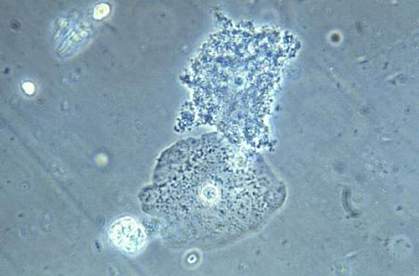You are here
June 2, 2020
Beneficial bacteria prevent recurring bacterial vaginosis
At a Glance
- An experimental treatment for a common infection called bacterial vaginosis significantly reduced the rates of recurrence.
- Replenishing L. crispatus bacteria may be an effective treatment for women with a history of bacterial vaginosis.

Bacterial vaginosis (BV) is the most common vaginal infection in women of reproductive age, affecting 15 to 50% of women. It’s caused by an imbalance in the mix of bacteria normally found in the vagina.
BV often has no symptoms, but for some women it can be uncomfortable or painful. Left untreated, it can increase the risk of contracting HIV and other sexually transmitted infections (STIs). BV is also linked to higher rates of premature birth and low birth weight babies. BV can be cured with antibiotics, but it often comes back within months.
Researchers led by Drs. Craig R. Cohen and Anke Hemmerling of the University of California, San Francisco, have been testing a new treatment using beneficial bacteria to prevent BV from recurring. The work was funded by NIH's National Institute of Allergy and Infectious Diseases (NIAID). Findings were published in the New England Journal of Medicine on May 14, 2020.
The researchers tested a treatment called LACTIN-V, which contains Lactobacillus crispatus bacteria. This strain is common in the healthy vaginal microbiome (the collection of microorganisms living there). The scientists hypothesized that LACTIN-V treatment could prevent the growth of more harmful bacteria that cause BV.

The study enrolled 228 women ages 14 to 45 who were diagnosed with BV. All participants tested negative for STIs. The women first received a five-day vaginal course of metronidazole antibiotic gel to treat their infection. They then returned to the clinic and were randomly assigned to receive either applicators containing LACTIN-V or an inactive placebo. They were instructed to use the applicators five times during the first week and then twice weekly for 10 weeks.
The women came for follow-up visits at 4, 8, 12, and 24 weeks to see whether BV had returned. The researchers also measured L. crispatus levels and performed additional STI tests, if necessary.
The team found that LACTIN-V significantly reduced the rate of BV recurrence. After 12 weeks, 30% of women receiving LACTIN-V had a recurrence of BV compared to 45% of women receiving placebo. At 24 weeks, 39% of the LACTIN-V group had recurring BV versus 54% of the placebo group.
Almost 80% of women receiving LACTIN-V had detectable levels of the L. crispatus bacteria at 12 weeks. At 24 weeks, the beneficial bacteria were detected in about 50% of the women who received the treatment.
“This is an entirely new approach that strengthens the vaginal microbiome against infections,” Hemmerling says.
The study authors note that a larger clinical trial is needed to confirm the results of this study.
Related Links
- Microbiome Influences Risk of Preterm Birth
- The Healthy Human Microbiome
- Human Microbiome Project
- Bacterial Vaginosis
References: Randomized Trial of Lactin-V to Prevent Recurrence of Bacterial Vaginosis. Cohen CR, Wierzbicki MR, French AL, Morris S, Newmann S, Reno H, Green L, Miller S, Powell J, Parks T, Hemmerling A. N Engl J Med. 2020 May 14;382(20):1906-1915. doi: 10.1056/NEJMoa1915254. PMID: 32402161.
Funding: NIH’s National Institute of Allergy and Infectious Diseases (NIAID).
